Surely, if you could ask your employees anything, you would like to find out, for example: what do the employees of your company value the most? Or how has the coronavirus crisis management been perceived? How has a specific aspect been improved or worsened over time?
We had similar questions about the 3 main employers in the UK: Accenture, Capgemini, and Goldman Sachs.
In order to really understand employee perception towards these companies we have used our Symanto Insights Platform to analyse 2780 reviews gathered from Glassdoor.
The results allowed us to identify:
• Individual barriers and drivers of all three.
• Major changes in Employee attitudes from last year until now and in relation to current COVID situation.
• Employee psychographics, which are surprisingly similar between the three.
• Differences in relation to the scope of business as well as company existence.
The insights generated from online reviews have provided us with the first view of strengths and weaknesses of these 3 companies from their worker’s point of view.
Accenture: overtime is better with good colleagues
Accenture, on their Careers page, professes ideas such as:
• “Work at the heart of change”.
• “Together, we work to harness meaningful, powerful change”.
The words together and change are repeated quite often in the careers page. But, does this match the real perception that employees have of the company?
Accenture drivers and barriers
People working for Accenture in the UK have a positive perception of the company and, using our technology, we easily discover that the top driver is the topic “employees.”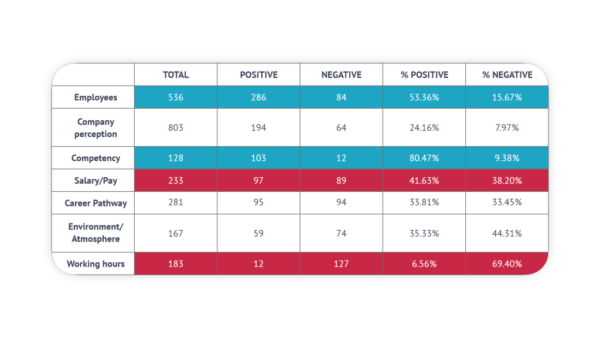
The experience with colleagues seems to be important here and fits with the psychographic profile, whereas the characteristic of shaping opinions based on experiences appears predominant. Based on this data, their employees also are quite rational when it comes to making decisions.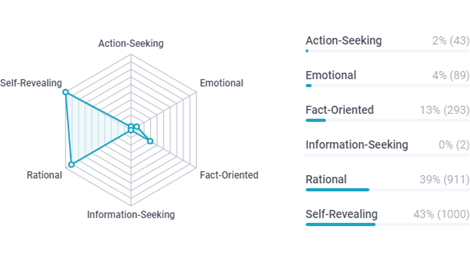
Capgemini and Goldman Sachs have similar profiles. The only difference is the lower level of fact-orientation in Goldman Sachs,
perhaps due to the nature of business, investment banking.
Most employees agree that working for the firm builds professional competence, which is another important driver. “Competence” is about doing something successfully or efficiently, so in this aspect, we can see coherence between the company value proposition and the employees’ real opinions.
The main barrier without a doubt, is the “working hours” topic. The environment and atmosphere in the working place are other barriers that require attention.
In the middle, with divided perception between positive and negative, are “salary” and “career pathway.” Let us look at how this last evolved during this year.
Career pathway and development evolution
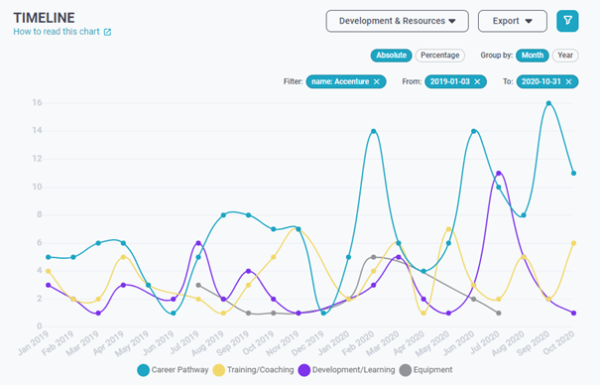
“Career pathway” is an ongoing trend followed by “training/coaching” and “development/learning” with ups and downs. Digging a little deeper, we discover that there is a significant barrier under the “career pathway” topic: high employee turnover.
To address these issues, it is necessary to both identify the needs of employees, to prevent them from choosing to leave when they are not met; and stabilize the training and development process, to incentivize them to stay and grow with the company.
Since February 2020, “equipment” and “inventory” in general is on the decline. This trend is because most employees have been adapting to the global situation and working from home.
Capgemini: flexibility as part of the salary
Capgemini highlights the importance of trust and ethics in its business as we can deduct from its value proposal:
• “Trust is at the heart of a successful company.”
• “Since the creation of the Group in 1967, ethics and our seven core values have been at the heart of Capgemini’s corporate culture and all of our business dealings. They are: honesty, boldness, trust, freedom, fun, modesty, and team spirit.”
Can we see those ideas reflected in the data?
Capgemini drivers and barriers

The top two drivers, “employees” and “company perception” are the same as those for Accenture. However, the rest of the topics change quite a bit, which is expected considering the employee value proposition of Capgemini.
The proposal is clearly represented by the topics “attitude/behavior” and “supportive”, which are perceived as positive for most employees.
“Flexibility” is another important driver but does not appear to compensate for concerns about low salary, which is their biggest barrier.
“Career pathway” and “work-life balance” emerge as topics that interest employees. There are more positive than negative opinions regarding both aspects but, the number of negative ones makes reviewing these aspects something to consider.
Trending topics among Capgemini employees
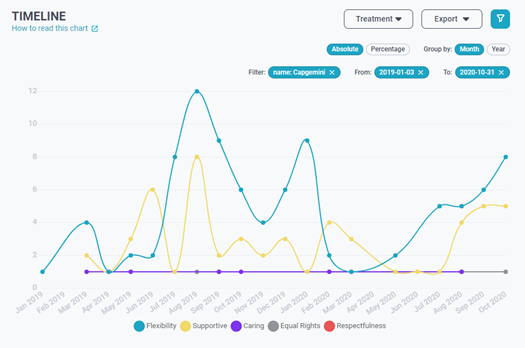
We observe that the topics “equal rights”, “caring” and “respectfulness” show a constant line which confirms the company identity with trust and ethical behavior as the leading prism.
However, “flexibility” is at an all-time low at the beginning of COVID and experiences a rise after March 2020.
“Supportiveness” has also been a changing point over the year. In this case, finding a way of making it more stable would be the next priority.
Goldman Sachs: a great environment to focus only on work
What about Goldman Sachs’s culture and value proposition? We summarize the most relevant ideas to better understand the essence of the company:
- “Ours is a culture of teamwork.”
- “At every step of our employees’ careers we invest in them, and ensure their interests remain focused on the long term and closely aligned with those of our clients and shareholders.”
- “Our commitment to creating and sustaining a diverse work environment is absolute.”
See what employees have to say about this!
Goldman Sachs drivers and barriers
The main driver and barrier for Goldman Sachs are the same as those identified for Accenture: “employees” and “working hours”, respectively.
Working long hours makes maintaining a “work-life balance” nearly impossible, so it is understandable that it appears as the second barrier.
“Salary” and “competency” are also drivers, which help offset the effect of working overtime.
COVID affects employee perception
“Company perception” is largely positive in general, but it has been affected by the environment generated during the COVID crisis: working from home, fast-paced changes, or trying to accomplish teamwork at a distance negatively impact the company perception and employee satisfaction.
In order not to lose this powerful driver, it would be necessary to take initiative to regain the company spirit, focusing on the areas highlighted as problematic by the data analysis.
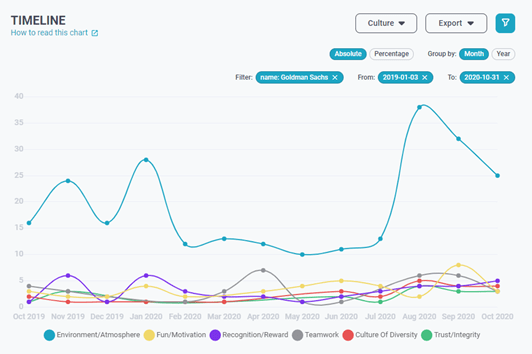
A quick comparison: Who wins?
We can recognise a significant difference in topic distribution between the younger companies and Goldman Sachs, which also reflects the differences in the scope of business: consulting vs. investment banking.![]()





• Goldman Sachs, which—with its 1869 inception, is the most mature of the companies analysed, ranks the highest when it comes to overall company perception, but ranks the lowest when it comes to professional growth.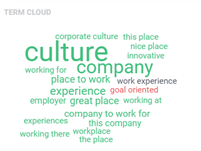

• Accenture as the youngest company among the three (founded in 1989), is leading when it comes to development opportunities; however, this ultimately leads to a high turnover.
• Capgemini demonstrates a high degree of flexibility, which tends to overlap with the work-life balance. Flexibility is a weaker point for both Goldman Sachs and Accenture.
Conclusions
Employee satisfaction is a critical success factor for organizations.
Even though each of the companies has its lights and shadows, the important thing is to understand them and keep improving, because this will enable you to not only keep productivity and engagement high today but increase retention and loyalty in the long run.
Consider the progress you could make by knowing more about what your employees are thinking.! What are you waiting for?
Book a free, personal demo now to understand real insights from your employees with the Symanto Insights Platform.

